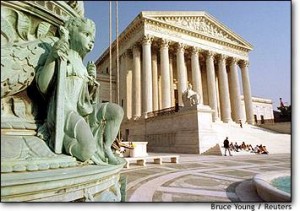 Whenever the Supreme Court makes a proper decision, it’s worthy of mention. That mention is doubly worthy when the case involves religious liberty. Earlier this week, the Court concluded, 9-0, that a church in Michigan had the right to determine whether or not to fire one of its workers who went against the beliefs and/or practices of the church. The worker in question had sued for discrimination.
Whenever the Supreme Court makes a proper decision, it’s worthy of mention. That mention is doubly worthy when the case involves religious liberty. Earlier this week, the Court concluded, 9-0, that a church in Michigan had the right to determine whether or not to fire one of its workers who went against the beliefs and/or practices of the church. The worker in question had sued for discrimination.
Every specific case is unique, but the principle upheld in this decision is that the government has no role to play in judging whether a church is discriminatory when it hires and fires its own staff. The church alone makes that judgment. As one report on the decision stated,
All nine justices agreed that churches and other religious groups are given “special solicitude” by the Constitution to sometimes stand apart from the laws of the land. The First Amendment guarantees both freedom of religious expression as well as no government “establishment” of religion.
The Court declared,
The authority to select and control who will minister to the faithful—a matter strictly ecclesiastical—is the church’s alone. The church must be free to choose those who will guide it on its way.
This decision is supposed to be applied to all religious groups, not simply official churches. Therefore, Christian evangelical colleges and universities, such as Southeastern where I teach, should also be exempt from government interference over whom to hire and/or dismiss based on doctrine and practice. The real test as to whether this will hold will come when homosexuality becomes the issue. Will the government continue to step back, as it should, when an open homosexual sues for not being hired or for being fired from a position in a religious organization? Or will political correctness overrule this week’s decision? We’ll see.
Probably the most astounding thing about the ruling is that it was unanimous. There are some things even the staunchest liberal still has to acknowledge. I’m reminded of the time, about thirty years ago, when I was a doctoral student at American University in Washington, DC. For one semester, I served as an intern at the Supreme Court doing historical research at the Library of Congress across the street. As an intern, I got an invitation to the Supreme Court’s Christmas party [yes, they called it “Christmas”]. I recall they passed out booklets with Christmas carols for all to join in as a group sing. I was standing behind two of the Supreme Court justices. One of them—I believe it was Harry Blackmun, who wrote the horrendous Roe v. Wade abortion decision—who leaned over to his colleague and joked, “This is probably unconstitutional, right?” They both laughed, then sang the carols.
That was memorable.
